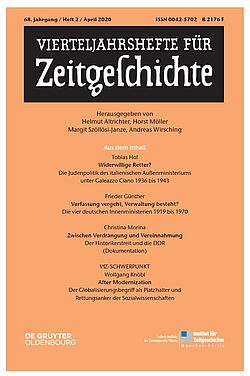- The Institute
- Research
- Dictatorships in the 20th Century
- Democracies and their Historical Self-Perceptions
- Transformations in Most Recent History
- International and Transnational Relations
- Edited Source Collections
- Dissertation Projects
- Completed Projects
- Dokumentation Obersalzberg
- Center for Holocaust Studies
- Berlin Center for Cold War Studies
- Publications
- Vierteljahrshefte
- The Archives
- Library
- Center for Holocaust Studies
- News
- Dates
- Press
- Recent Publications
- News from the Institute
- Topics
- Munich 1972
- Confronting Decline
- Feminist, Pacifist, Provocateur
- Der Mauerbau als Audiowalk
- Digital Contemporary History
- Transportation in Germany
- Envisaged Futures at the End of the Cold War
- From the Reichsbank to the Bundesbank
- German Federal Chancellery
- History of Sustainabilities: Discourses and Practices since the 1970s
- Changing Work
- Democratic Culture and the Nazi Past
- The History of the Treuhandanstalt
- Foreign Policy Documentation (AAPD)
- Dokumentation Obersalzberg
- Hitler, Mein Kampf. A Critical Edition
- "Man hört, man spricht"
- IfZ
- Vierteljahrshefte
- VfZ Archive
- Issue Index
- Issue April 2020
Issue 2/2020
Content Overview: English Titles and Abstracts:
- Tobias Hof: Reluctant Rescuers? The Jewish Policy of the Italian Foreign Ministry under Galeazzo Ciano, 1936 to 1943.
- Frieder Günther: Constitutions Come and Go, the Administration Endures? The Four Ministries of the Interior in Germany, 1919 to 1970.
- Christina Morina: Between Suppression and Appropriation. The Historikerstreit and the GDR.
- VfZ Focus Globalisation - Wolfgang Knöbl: After Modernization. The Term Globalisation as a Placeholder and Lifeline for the Social Sciences.
Abstracts
Tobias Hof, Reluctant Rescuers? The Jewish Policy of the Italian Foreign Ministry under Galeazzo Ciano, 1936 to 1943
Around the 80th anniversary of the Italian Racial Laws of 1938 there was increased interest in Italian antisemitism and the role of Italy in the persecution and murder of the European Jews. Despite this dynamic, empirical studies about the individual institutions and leading functionaries responsible for Jewish Policy are lacking to date. These studies are indispensable in order to explain when and why specific antisemitic tendencies and discourses guided regime action. The present article for the first time focuses on the Italian Foreign Ministry under Galeazzo Ciano as an actor in Jewish Policy. It not only investigates the position of leading diplomats towards the “Jewish Question”, which was shaped by racist worldviews, strategic considerations, difficult to grasp humanist dispositions, cynical-pragmatic cost-benefit calculations, economic concerns und internal Italian power struggles. The article shows how various marriages of convenience allowed the ministry to decisively help shape the Jewish Policy of the regime. This constant dynamic of marriages of convenience was one of the reasons, why Fascist Italy ultimately pursued a less radical policy than the Third Reich, even though the rhetoric of the Fascists was no less radical than that of the National Socialists.
Frieder Günther, Constitutions Come and Go, the Administration Endures? The Four Ministries of the Interior in Germany, 1919 to 1970
Which continuities existed between the state administrations of the Weimar Republic, the Nazi State, the Federal Republic and the GDR – and how did they differ? The article tries to provide nuanced answers to these questions; it places the respective Ministries of the Interior at the heart of its enquiry, thoroughly investigating their personnel, their administrative reform policies and their administrative cultures. While the Ministry of the Interior of the GDR differed considerably from the other three regarding personnel policy and the self-image of the staff, its administrative culture reveals some matches with those of the Reich Ministry of the Interior of the Nazi period. On the whole it becomes clear that strong political will to reshape is necessary during system changeovers if the persistence of modern bureaucracies is to be overcome.
Christina Morina, Between Suppression and Appropriation. The Historikerstreit and the GDR
The present contribution is the first publication of an analysis of the so-called Historikerstreit (historians’ dispute), written at the Hauptverwaltung Aufklärung (Main Directorate for Intelligence) of the Ministry of State Security in 1988. It illustrates that this was not a purely West German affair. The strategy of the East German historians, the SED leadership and the Stasi, which oscillated between suppression and appropriation in order to exploit the controversy in the media, in the field of research policy and in intelligence work, reveals the specific dealing with the Holocaust in the GDR in a new light. Simultaneously it shifts the focus to a hitherto little noted dimension of a historical-political debate. These East-West convergences and divergences in the political-cultural history of the Federal Republic of Germany have remained virulent long after the 1989/90 caesura.
Wolfgang Knöbl, After Modernization. The Term Globalisation as a Placeholder and Lifeline for the Social Sciences
Since the 1990s, the term globalisation has become a central catchword for the diagnosis of the times. This reveals a changed self-perception of the Social Sciences, which requires reflection if one wishes to avoid problematic premises in the use of this term. The article initially highlights aspects of the early globalisation debate and asks for the reasons of the fast rise of the globalisation discourse. Subsequently it analyses the theoretical consequences of the new semantics. Finally it discusses the question, what follows from the increasingly vocal criticism of the term globalisation, i.e. what possibilities still exist for the use of possible macro-sociological or -historical terms at all.
04/09/2024
„Die Lebensbeichte des Bandera-Mörders“
Der "Münchner Merkur" zu Grzegorz Rossoliński-Liebes Dokumentation im Aprilheft der VfZ
mehr
04/04/2024
„Die Beichte des Mörders von Stepan Bandera“
Die „Süddeutsche Zeitung“ zu Grzegorz Rossoliński-Liebes Dokumentation im Aprilheft der VfZ
mehr
04/02/2024
Druckfrisch: VfZ 2/2024
Das Aprilheft der Vierteljahrshefte für Zeitgeschichte ist erschienen
mehr








